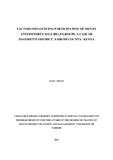| dc.description.abstract | Self-help group is a voluntary and self-managed group of people, belonging to similar socioeconomic
characteristics, who come together to address a felt need amongst themselves. The
self-help group (SHG) approach is a model into the field of development whose objectives are
to increase the well-being of the poor people, provide access to resources and credit, increase
self-confidence, self-esteem and increase their creditability in all aspects of lives. The purpose
of this study therefore was to investigate the factors influencing participation of men in antipoverty
SHGs in Dagoretti District of Nairobi County. The main research questions explored
the extent to which patriarchy system, masculinity, socio-culture and gender stereotyping
influences participation of men in SHGs. The research study adopted mixed research design
which combines elements of qualitative and quantitative approaches to provide breadth and
depth of understanding and corroboration of information. The data collection instruments
included questionnaires, interviews and Focused Group Discussions. The target population
was men in Dagoretti District and to some extent institutions that work with SHGs in
Dagoretti District. Study findings indicated Patriarchy system, Masculinity, Socio-culture and
Gender stereotyping have a significant influence on participation of men in anti-poverty
SHGs. Patriarchy indicators such as Key leadership in SHGs, gender preference in leadership,
dread of women domination as well as decision making patterns in SHGs were found to have
an influence on subscription of men in SHGs. Self-sufficiency, femininity and vulnerability
avoidance, overconfidence and hate of women domination indicated masculinity influences.
Belief such as help seeking is womanly, SHGs are not cultural for men and societal
expectations of men in regarding to seeking were also found to have an influence on
participation of men in SHGs. Stereotypes such as perception on which gender fits better in an
SHG, women are more natural members of SHGs, SHGs are women oriented, stereotypes in
policies of institutions working with SHGs and stereotypes related to low participation of men
and complexity of working with women were found to also contribute to the participation of
men in SHGs. Socio-culture and Gender stereotyping influences rated highest at 73% and
71.4% respectively with patriarchy system and masculinity influences at 67% and 59%. The
researcher recommended awareness creation on benefits of SHGs, changing stereotypes and
ancient perceptions regarding SHGs, evaluation of policies and practices of government and
institutions to ensure equitable development for all and investing more in education and
capacity building for the society to challenge traditional views of masculinity and cultural
expectations of men. The study concludes that for men, especially poor man to be encouraged
to participate in SHGs that would uplift their economic standards, there is need to address the
dominant patriarchy system, help men define what it is to be masculine in a way that favours
them, redefine socio-cultural arena and work towards changing stereotypes that cause men to
shun SHGs. Further studies should focus on perspectives of women on factors influencing
participation of men in SHGs and exploration of models of SHGs that men would be attracted
to. | en |

